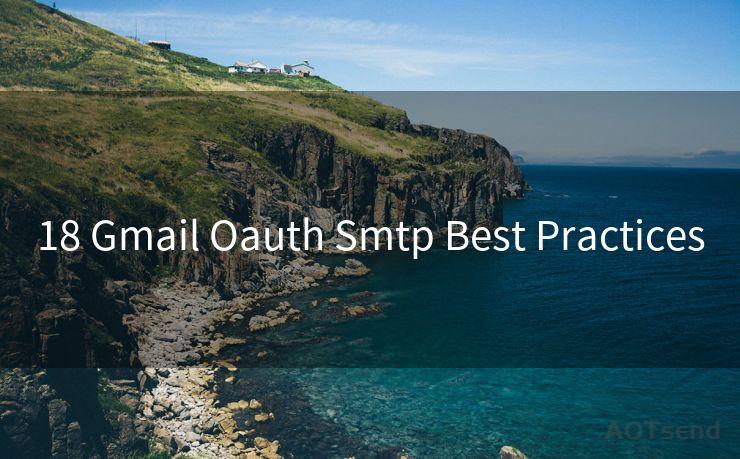18 Gmail Oauth Smtp Best Practices




When it comes to secure email communication, Gmail's OAuth SMTP authentication stands out as a robust and secure method. In this article, we'll explore 18 best practices for using Gmail OAuth with SMTP, ensuring your email communications are as secure as possible.
1. Understanding OAuth and SMTP
Before diving into the best practices, it's crucial to understand OAuth and SMTP. OAuth is an open standard for authorization, allowing third-party applications to access user data without using their passwords. SMTP, or Simple Mail Transfer Protocol, is used for sending emails. Combining these two technologies enhances email security significantly.
2. Enabling OAuth 2.0 in Gmail
To utilize OAuth with Gmail, you must first enable OAuth 2.0 in your Gmail account. This involves creating a project in the Google Developers Console, configuring OAuth consent screens, and setting up credentials.
3. Securing Your Credentials
Your OAuth credentials, including the client ID and client secret, must be kept secure. Avoid storing them in plain text or sharing them publicly.
4. Using the Correct Scopes
When requesting access tokens, ensure you're using the correct OAuth scopes. For Gmail SMTP, the "https://mail.google.com/" scope is typically required.
5. Implementing Token Refresh
OAuth access tokens have an expiration time. Implement a mechanism to automatically refresh these tokens before they expire to ensure uninterrupted service.
6. Validating Tokens
Always validate OAuth tokens received from Gmail to ensure they're authentic and haven't been tampered with.
7. Encrypting Communications
When using OAuth with SMTP, ensure that all communications between your application and Gmail servers are encrypted using SSL/TLS.
8. Monitoring and Logging
Implement robust monitoring and logging mechanisms to track OAuth token usage, detect any suspicious activities, and aid in troubleshooting.
9. Handling Errors Gracefully
Prepare your application to handle OAuth and SMTP errors gracefully, providing clear feedback to users and administrators.
10. Regularly Updating Libraries
Keep your OAuth and SMTP libraries up to date to benefit from the latest security patches and improvements.
11. Restricting Access
Limit OAuth token usage to only the necessary operations, reducing the risk of unauthorized access or misuse.
12. Two-Factor Authentication
Consider enabling two-factor authentication for Gmail accounts used with OAuth, adding another layer of security.
13. Avoiding Deprecated Features
Stay away from using deprecated OAuth or SMTP features, as they may pose security risks.
14. Auditing and Reviewing
Conduct regular audits and reviews of your OAuth and SMTP implementations to identify and address any potential vulnerabilities.
15. Educating Users
Educate users about OAuth and its benefits, encouraging them to authorize only trusted applications.
16. Testing in a Sandboxed Environment
🔔🔔🔔
【AOTsend Email API】:AOTsend is a Managed Email Service for sending transactional emails. Support Email Types: reminders, authentication, confirmations, notifications, verification codes, invoices, password resets, account activations, billing statements, two-factor authentication (2FA), and one-time passwords (OTP) emails, etc. $0.28 per 1000 Emails. 99% Delivery, 98% Inbox Rate.
You might be interested in:
Why did we start the AOTsend project, Brand Story?
What is a Managed Email API, How it Works?
Best 25+ Email Marketing Platforms (Authority,Keywords&Traffic Comparison)
Best 24+ Email Marketing Service (Price, Pros&Cons Comparison)
Email APIs vs SMTP: How they Works, Any Difference?
Before deploying to production, test your OAuth SMTP integration in a safe, sandboxed environment.
17. Preparing for Emergencies

Have a contingency plan in place to handle OAuth token revocations or other emergencies that might affect email communications.
18. Staying Informed
Keep up with the latest Gmail OAuth and SMTP best practices and updates from Google to maintain the highest level of security.
By following these 18 Gmail OAuth SMTP best practices, you can significantly enhance the security of your email communications, protecting sensitive information and ensuring reliable email delivery.




Scan the QR code to access on your mobile device.
Copyright notice: This article is published by AotSend. Reproduction requires attribution.
Article Link:https://www.mailwot.com/p4789.html



